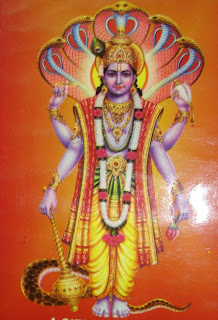

Believers believe that regular chanting of the hymn can accrue benefits.
On avoiding evil, succeeding in battle, and gaining affluence, pleasure,
happiness, and offspring:Bhisma said, "Even thus have I recited to thee, without
any exception, the thousand excellent names of the high-souled Kesava whose
glory should always be sung. That man who hears the names every day or
who recites them every day never meets with any evil either here or hereafter.
If one becomes desirous of earning the merit of righteousness, one succeeds in
earning it (by hearing or reciting these names). If it is wealth that one desires,
one succeeds in earning wealth (by acting in this way). So also the man who wishes
for enjoyments of the senses succeed in enjoying all kinds of pleasures and the man desirous of offspring
acquires offspring (by pursuing this course of conduct)."
Let us do the five verses on Vishnu on this fourth day of our
chanting and remembering.
yataH sarvaaNi bhuutaani bhavantyaadi yugaagame |
yasmiM shcha pralayaM yaanti punareva yugakshaye ||
tasya loka pradhaanasya jagannaathasya bhuupate |
vishhNornaamasahasraM me shRuNu paapa bhayaapaham ||
yaani naamaani gauNaani vikhyaataani mahaatmanaH |
RishhibhiH parigiitaani taani vakshyaami bhuutaye ||
RishhirnaamnaaM sahasrasya vedavyaaso mahaamuniH |
chhando.anushhTup tathaa devo bhagavaan devakiisutaH ||
amRitaaM shoodbhavo biijaM shaktirdevakii nandanaH |
trisaamaa hrudayaM tasya shaantyarthe viniyujyate ||
vishhNuM jishhNuM mahaa vishhNuM prabhavishhNuMmaheshvaram |
anekaruupa daityaantaM namaami purushhottamam ||
The god of gods and the eternal indestructible father of beings
(unlike the evanescent type of earthly fathers) from whom all beings
originate at the commencement of the first yuga, and in whom they
all converge ultimately, that is, at the end of the yuga.
Hear from me, O king! The thousand names of Lord Vishnu, the dispeller
of the fear of sin, the sovereign master of the universe, lokkapradhAnasya -
the pivot on which the entire universe,with all its contents (things and beings) rests.
For the good of all, I shall tell you the names of the Supreme Being, well-known and
well-sung by the rishis
The great veda vyasa is the rishi of these thousand names of vishnu, 'Anustup' is its
meter, the presiding deity is devaki's son,
The seed (bijam) is "the one born in the lunar race", its power is "the darling of devaki"
it's heart (hrdayam) is the name "one who is lauded by the three sAma hymns",
and its purpose is the attainment of peace.
I bow to vishnu, the victorious, the all-pervading, the mighty, the lord of all, the enemy
of daityas(demons), possessed of many forms and the best of purusas.























